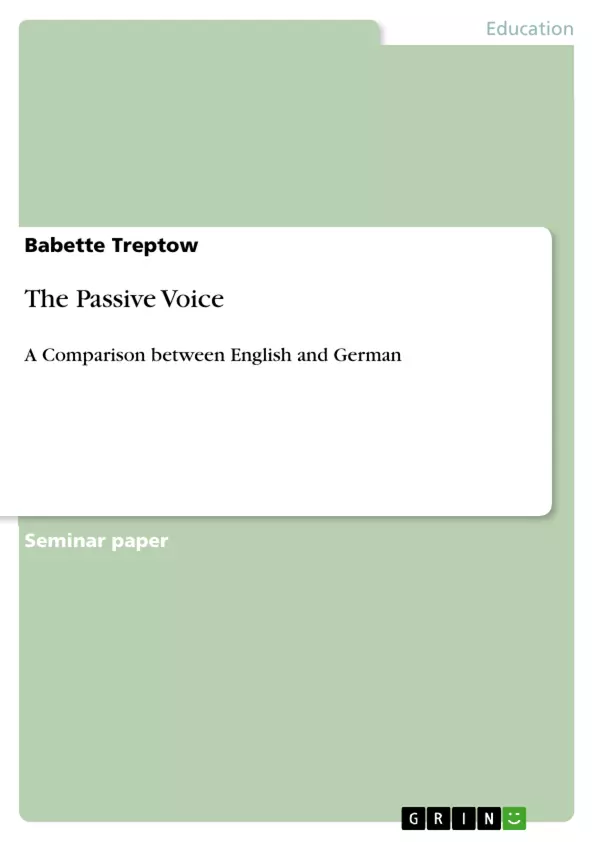Since English and German belong to the West Germanic family, both languages are - considered from a historical perspective – closely related. However, English and German have developed in entirely different ways over time. While English was strongly influenced by many foreign languages, such as French, German remained closer to the language group both originally derived from. Precisely these divergent developments make a contrastive analysis between the two major languages particularly interesting. Within this paper, English and German will be compared with regard to the passive voice, one form of the grammatical category voice that is, according to König & Gast (2009: 123), easy to identify in English and German and rather unproblematic to compare. In its general meaning, the term voice is used interchangeably with diathesis. In this sense, the concept of voice
relates to the argument structure of predicates, i.e. the relationship between thematic roles like Agent, Patient, Instrument and grammatical functions like subject and object, as well as to the alternations found between different argument structures. (ibid.).
While diathesis appears to be a characteristic of any verb, voice - in the more restricted understanding of the word – “means the form of a [...] verb which shows whether the person or thing denoted by the subject acts or is acted upon” (Xavier 2008: 50). The narrower concept of voice, thus, differentiates between the active and the passive.
In the course of my studies, the grammatical phenomenon of voice has been used several times to exemplarily compare English with German. The system of voice in English and German has been (re-)introduced in the course of this semester´s seminar English in Contrast. Therefore, my interest in this topic was already raised before the seminar and I found it particularly interesting to learn more about the differences of English and German passives. As a future teacher of both of these major languages, I consider this an excellent opportunity to gain a detailed inside into this matter.
This term paper aims at figuring out in how far the passive voice is different in English and German. Despite both languages` very same origin, it is assumed that, due to language change, English and German show considerable differences in the passive voice. The work by König & Gast (2009) will be taken as the basis for a discussion on this question...
Table of Contents
- Introduction
- General Background Information on the Passive Voice in English and German
- Form and Functions
- Long Passives versus Short Passives
- Passive Auxiliaries
- English
- German
- Different Types of Passives in English and German
- Passives with Intransitive Verbs
- Passives with Transitive Verbs
- Monotransitive Verbs
- Ditransitive Verbs with Indirect and Direct Object
- Prepositional Passives
- Conclusions
Objectives and Key Themes
This term paper aims to explore the differences between the passive voice in English and German. It focuses on the structural and functional differences between the two languages, including short and long passives and the use of auxiliary verbs. The paper utilizes research by König & Gast (2009) as its foundation, drawing on the work of other prominent linguists such as Quirk (1991) and Eisenberg (2004) to provide diverse perspectives on the topic.- Structural and functional differences between active and passive voices in English and German
- Comparison of short and long passives in both languages
- Analysis of auxiliary verbs in English and German passives
- Examination of different types of passives, including those formed with intransitive and transitive verbs
- Identification of similarities and differences in the passive voice between English and German
Chapter Summaries
Introduction
This chapter introduces the topic of the passive voice in English and German, highlighting the historical relationship between the two languages and the contrasting developments that have led to differences in their grammatical structures. The chapter defines the concept of "voice" and "diathesis" in linguistic terms, setting the stage for the detailed analysis of the passive voice in the following chapters.General Background Information on the Passive Voice in English and German
This chapter explores the structural and functional aspects of the passive voice in both languages. It details the changes that occur when transforming a sentence from active to passive voice, focusing on the role of the subject, object, and verb phrase in both languages. The chapter also examines the relationship between active and passive voice in terms of semantic roles and emphasis, as well as the relative frequency of passive constructions in English and German.Different Types of Passives in English and German
This chapter delves deeper into the different types of passive voice constructions in English and German. It examines passives formed with intransitive and transitive verbs, with particular attention to monotransitive, ditransitive, and prepositional passives. The chapter highlights the differences and similarities between the two languages in these specific passive forms.Frequently Asked Questions
What is the difference between the English and German passive voice?
Despite their common West Germanic origin, the two languages have developed different structures for passive auxiliaries and handle transitive/intransitive verbs differently.
What are "Short Passives" versus "Long Passives"?
Short passives omit the agent (the doer), while long passives include the agent, typically using "by" in English or "von/durch" in German.
How do auxiliary verbs differ in passive constructions?
English primarily uses "to be," whereas German distinguishes between the "Vorgangspassiv" (using "werden") and "Zustandspassiv" (using "sein").
Can intransitive verbs be used in the passive voice?
German allows impersonal passives with many intransitive verbs (e.g., "Es wurde getanzt"), a construction that is generally not possible in English.
What is the "prepositional passive" in English?
English can turn the object of a preposition into the subject of a passive sentence (e.g., "The bed was slept in"), which is a significant difference from German grammar.
- Arbeit zitieren
- Babette Treptow (Autor:in), 2012, The Passive Voice, München, GRIN Verlag, https://www.grin.com/document/208788



